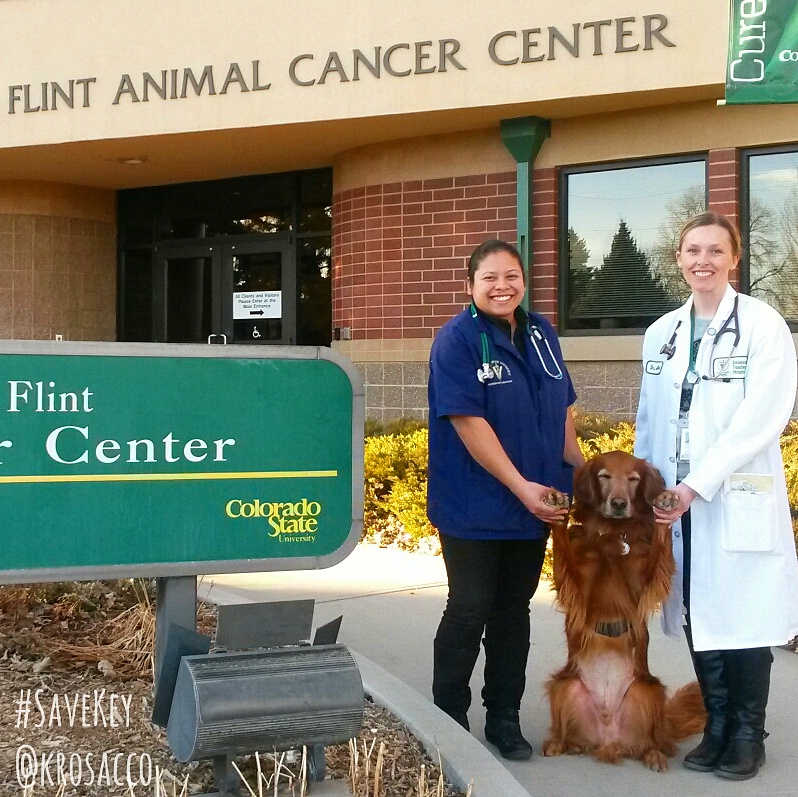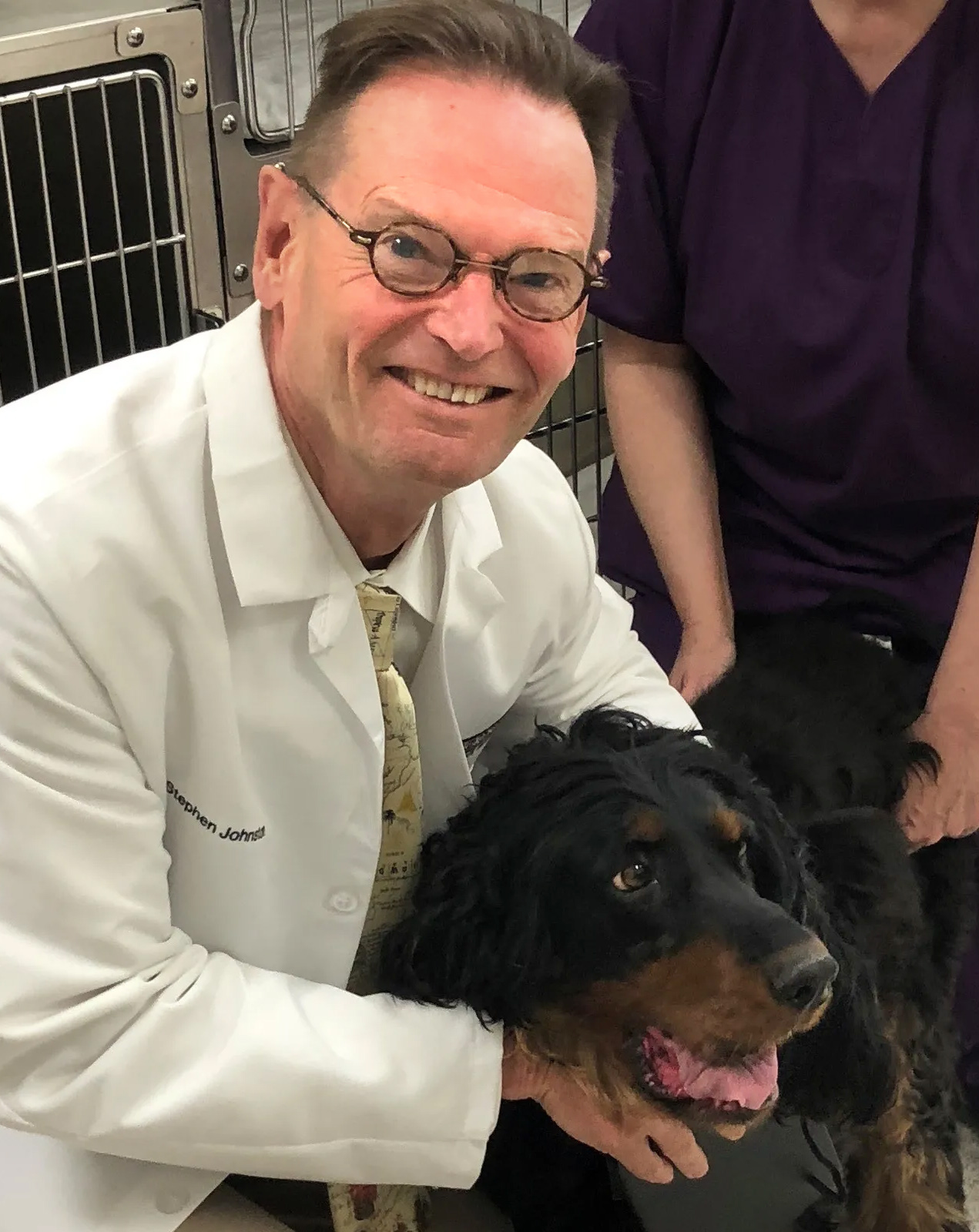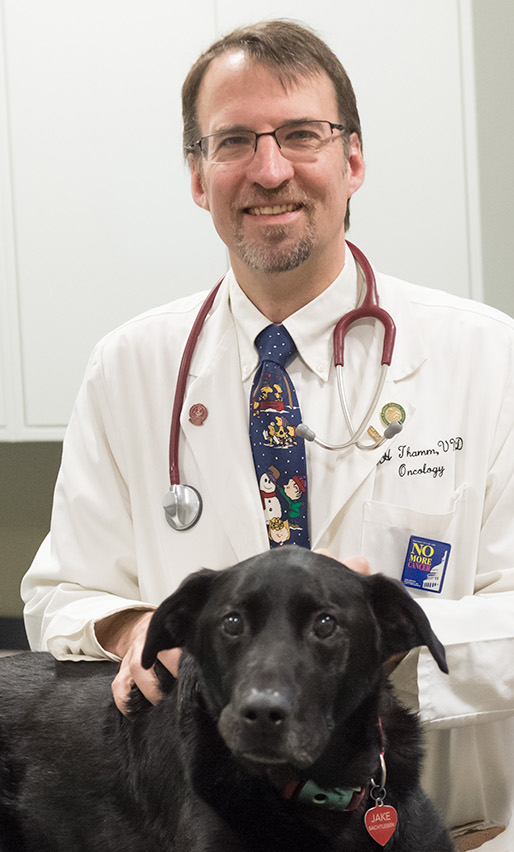Canine Cancer Vaccine Study Seeks Participants
 Those who know the Canine University of Denver know that the initial reason why we’re now in Colorado is our Pawfessor and Therapy Dog Key. He’s an 8 y/o golden retriever who was diagnosed with two types of cancer (lymphoma and melanoma) when he was 5 in Venezuela, where he was given 6 months to live. Devastated by the unexpected news and not willing to let Key go without a fight, his mom and founder of the University, Caro Sacco, grabbed all of her savings and set up a fundraiser to bring him to the US to get the much needed medical attention. This is how we got to know CSU while googling for the best canine cancer centers in the world. From the first moment, CSU was incredibly receptive and helped us plan everything. Two months after getting the diagnosis, we had arrived in Fort Collins and a couple days later we had our first appointment. Absolutely everyone was so supportive and understanding, and they were very excited about finally meeting this wonderful and much loved international patient. Key had a surgery and follow up treatment and since then, he’s had regular check-ups every 3-4 months with a few other surgical procedures, and every test has come out 100% cancer free! No words can express our gratitude towards CSU so now we want to help them out and also other dogs and their pawrents promoting this amazing study, because nobody should go through the pain and fear that comes along with cancer.
Those who know the Canine University of Denver know that the initial reason why we’re now in Colorado is our Pawfessor and Therapy Dog Key. He’s an 8 y/o golden retriever who was diagnosed with two types of cancer (lymphoma and melanoma) when he was 5 in Venezuela, where he was given 6 months to live. Devastated by the unexpected news and not willing to let Key go without a fight, his mom and founder of the University, Caro Sacco, grabbed all of her savings and set up a fundraiser to bring him to the US to get the much needed medical attention. This is how we got to know CSU while googling for the best canine cancer centers in the world. From the first moment, CSU was incredibly receptive and helped us plan everything. Two months after getting the diagnosis, we had arrived in Fort Collins and a couple days later we had our first appointment. Absolutely everyone was so supportive and understanding, and they were very excited about finally meeting this wonderful and much loved international patient. Key had a surgery and follow up treatment and since then, he’s had regular check-ups every 3-4 months with a few other surgical procedures, and every test has come out 100% cancer free! No words can express our gratitude towards CSU so now we want to help them out and also other dogs and their pawrents promoting this amazing study, because nobody should go through the pain and fear that comes along with cancer.
Never before has there been a canine clinical trial of this magnitude, and it could not only provide cancer prevention for pets soon but also do the same for humans in the future. This vaccine would block a wide variety of cancers, rather than targeting just one type, and has been proven effective in mice already.
They’re looking for 800 dogs who live within 150 miles of one of the participating trial sites (Colorado State University – Fort Collins, the University of Wisconsin – Madison and the University of California – Davis). To be eligible, they must:
- Be 6 – 10 years old
- Weigh at least 12 pounds (5 kg)
- Have no history of cancer or autoimmune disease
- Have no significant illnesses that could result in a life span fewer than five years
- Have no current treatment with oral or injectable immunosuppressive medications
- Be one of 45 breeds which include: golden retriever, labrador retriever, german shepherd, boxer and a variety of mixed-breeds. Click here for full list of breeds.
Pups that meet the criteria will be selected randomly to receive the vaccine or a placebo and will visit the study site for check-ups 2-3 times/year for 5 years.
Patients that receive the placebo vaccine are expected to develop cancer at normal rates and the trial will determine whether the vaccine can delay or prevent cancer development in the vaccinated group. Regardless, owners whose dog develops cancer during the trial will be given hospital credit for the diagnosis and treatment of the cancer.
Where did this vaccine come from?
 For decades, conventional wisdom has suggested that a universal, preventive cancer vaccine would not be possible because all cancers are unique. Nevertheless, Stephen Johnston, a professor and director of the Center for Innovations in Medicine, part of the Biodesign Institute at Arizona State University, and his team discovered a way to identify commonalities among cancerous tumors, and used that information to develop what they believe is a potential one-size-fits-all cancer prevention vaccine.
For decades, conventional wisdom has suggested that a universal, preventive cancer vaccine would not be possible because all cancers are unique. Nevertheless, Stephen Johnston, a professor and director of the Center for Innovations in Medicine, part of the Biodesign Institute at Arizona State University, and his team discovered a way to identify commonalities among cancerous tumors, and used that information to develop what they believe is a potential one-size-fits-all cancer prevention vaccine.
Such vaccine, called multivalent frameshift peptide vaccine, was effective in mice and has been shown to be safe for use in other pets.
 After developing and testing the vaccine in the lab, Johnston needed to identify a veterinarian to move the vaccine into a clinical trial in dogs and he chose Colorado State University’s Dr. Douglas Thamm, director of clinical research at the Flint Animal Cancer Center at the James L. Voss Veterinary Teaching Hospital, a trusted colleague who has collaborated with him for more than a decade.
After developing and testing the vaccine in the lab, Johnston needed to identify a veterinarian to move the vaccine into a clinical trial in dogs and he chose Colorado State University’s Dr. Douglas Thamm, director of clinical research at the Flint Animal Cancer Center at the James L. Voss Veterinary Teaching Hospital, a trusted colleague who has collaborated with him for more than a decade.
“When Stephen brought up the idea of a universal cancer preventative vaccine, I was skeptical,” Thamm said. “However, the data he has shared has convinced me that the vaccine is worth testing.”, said Dr. Thamm. Testing this approach in dogs will serve as the perfect bridge to human studies.
The project is funded through a $6.4 million grant from the Open Philanthropy Project, which was awarded to Johnston in 2018.
To begin the enrollment and screening process, click here.



